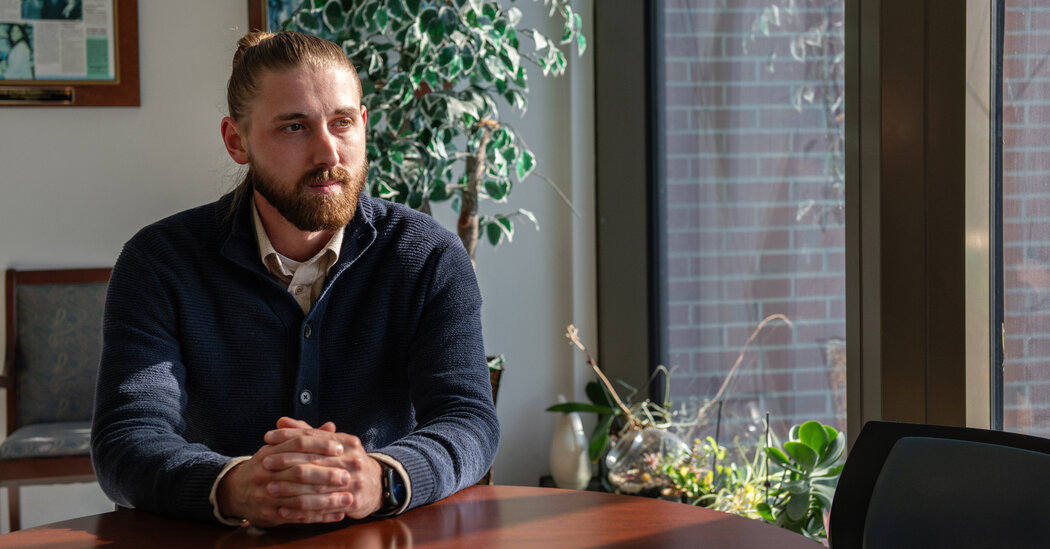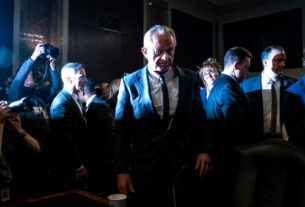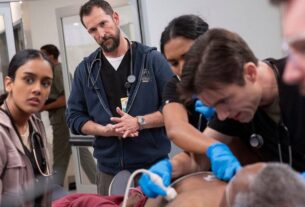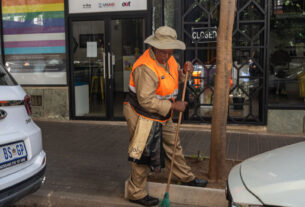Tyler Nelson, a postdoctoral researcher at the University of Florida, studies the neurobiology of pain, a choice partly motivated by his own frustrations with a neuromuscular disability. Last October, he applied for a grant at the National Institutes of Health that, if awarded, would support his dream of someday running his own lab.
But, earlier in February, he learned that his application, which took six months to pull together, was about to be thrown out.
The reason: Dr. Nelson had applied for a version of the award that supports researchers who are historically underrepresented in science, including people with disabilities. That funding avenue now violates President Trump’s executive order banning federal agencies from activities related to diversity, equity, inclusion and accessibility, or D.E.I.A.
Dr. Nelson was tipped off by an N.I.H. affiliate, but he has received no official notice about the situation. “I’ve tried to call probably 150 times,” he said. Unofficially, he learned that the agency was planning to pull his submission altogether rather than move it to the general award pool for consideration. This has happened with at least one other type of award offered by the agency, which did not respond to a request for comment.
Thanks to the tip, Dr. Nelson was able to withdraw his application and resubmit it to the general award pool before its deadline — but he is unsure if others were so lucky.
“What this does is discriminate against people who are underrepresented,” said an N.I.H. reviewer who asked to remain anonymous for fear of retaliation. The reviewer added that the evaluation criteria for the general and diversity award pools were the same, with no priority given to either pool. “I can’t stress enough,” the reviewer said, that an undeserving grant “is not going to get funded, whether it’s ‘diversity’ or not.”
According to Eve Hill, a civil rights lawyer in Washington, D.C., this may violate certain legal protections for people with disabilities, although there is no precedent in court.
“They’ve provided this category to overcome past discrimination,” she said. “By not then considering them in the general award, they are exacerbating that discrimination.”
The predicament is one of many ways that accessibility across the sciences is taking a hit from the D.E.I.A. shutdown. Federal agencies, once proponents for increasing opportunities for scientists with disabilities, are now ceasing programs geared toward that goal. Left uncertain is how funding for disability research — from designing accessible health services to building better prosthetics — will be affected by the order.
People with disabilities make up more than a quarter of the nation’s population and are considered to be the world’s largest minority. But experts say that, until recently, disability has largely been neglected in discussions about marginalized groups.
“Accessibility was always seen as an afterthought,” said Kim Knackstedt, a disability policy consultant in Washington, D.C. “Whether intentional or not, disability has been excluded from a lot of D.E.I. efforts.”
That extends to the sciences. The National Science Foundation reported that, in 2021, people with disabilities made up only 3 percent of the STEM work force. Only in 2023 did the N.I.H. designate people with disabilities as a community that experienced health disparities.
As the first director of disability policy in the Biden administration, Dr. Knackstedt led a push for accessibility to be at the forefront of diversity, equity and inclusion policy. One outcome of this effort was an executive order issued by President Biden that explicitly named accessibility as an area to strengthen in the federal work force.
“That was a win for many of us,” said Bonnielin Swenor, an epidemiologist who founded the Disability Health Research Center at Johns Hopkins University. Dr. Swenor, who experienced barriers pursuing a research career because of a visual impairment, added that it was disheartening “to have that progress not just stopped, but rolled back.”
Federal science agencies scrambled to comply with the reversal, leaving scientists and disability advocates apprehensive about the future of accessibility research. Earlier this month, the National Science Foundation began flagging grants that contained buzzwords commonly associated with D.E.I.A., including “disability” and “barrier.”
An N.S.F. program director, who asked not to be named out of fear of retaliation, said that there were “quite a few awards flagged for the word ‘disability,’” including projects to make driving and computing more accessible. The program director added that staff members were unsure if these research activities were banned by the executive order.
A spokesman for the N.S.F. did not answer questions sent by The New York Times regarding the eligibility of such awards.
Robert Gregg, an engineer at the University of Michigan who designs wearable robots for people with mobility impairments, said he had received notification from the N.S.F. to halt D.E.I.A. activities. But he interpreted that to mean supplemental programs aimed at increasing participation of underrepresented groups in science.
“Fundamental research in technology, like robotics and A.I. — my understanding is that that is still perfectly valid and can continue,” he said. But Dr. Gregg also runs clinical trials funded by the N.I.H., and he recently learned that the renewal process for this funding had effectively been frozen again.
Scientists with disabilities are also worried about what the clampdown on accessibility will mean for both their own careers and those of the next generation.
“Disabled people were barely being included,” said Alyssa Paparella, a graduate student at the Baylor College of Medicine who founded an online movement called #DisabledInSTEM. “Now there’s a huge fear of what’s going to be the future of all of us.”
A notice on the N.I.H. website encouraging participation of people with disabilities in the research enterprise has been removed, as has an N.S.F. webpage that listed funding opportunities for scientists with disabilities. Last month, the N.S.F. also indefinitely postponed an engineering workshop to better include people with autism and other neurocognitive differences in the work force.
In the geosciences, many degree programs require students to complete weekslong outdoor field camps that can be difficult to navigate with certain disabilities. This led Anita Marshall, a lecturer at the University of Florida, to found GeoSPACE, an N.S.F.-funded camp that incorporates modern technology and can be completed virtually.
She did not know if GeoSPACE would be able to continue. “This has really knocked me off my feet,” said Dr. Marshall, who described the project as her pride and joy. “I’m not sure what’s next.”
Doubts have sprung up for Dr. Nelson, too. Although he managed to salvage his application for N.I.H. funding, the change has pushed back any clarity about his future in research by at least five months.
“It’s a really dismal time in science for trainees,” he said. “I look at the last 15 years, like, ‘Why did I work this underpaid, high-stress job?’ Do I want to do this forever?”





